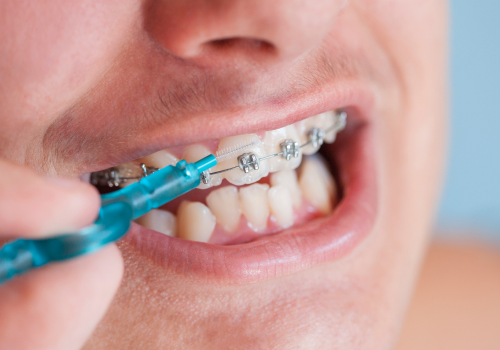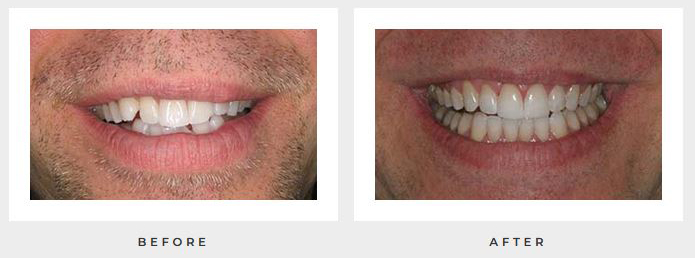Yellow Teeth Despite Good Hygiene
 My daughter has an ongoing problem with yellow teeth and cavities despite our hygiene routine of brushing, flossing, and limiting her sugar intake. Our pediatric dentist put sealants on my daughter’s upper and lower molar teeth. Still, I think her plaque buildup is unusual because we limit her sugar intake to once every other weekend. I’m unsure if her yellow teeth are genetic because my husband was an only child, and his parents died when he was 2. My daughter is entering her pre-teens, and we are concerned about her self-image. I haven’t seen any improvement with dental cleanings at the pediatric dentist’s office either. I feel that her dentist thinks I am overreacting. I’m concerned. Are we overlooking something, or am I genuinely overacting? Jada from WV
My daughter has an ongoing problem with yellow teeth and cavities despite our hygiene routine of brushing, flossing, and limiting her sugar intake. Our pediatric dentist put sealants on my daughter’s upper and lower molar teeth. Still, I think her plaque buildup is unusual because we limit her sugar intake to once every other weekend. I’m unsure if her yellow teeth are genetic because my husband was an only child, and his parents died when he was 2. My daughter is entering her pre-teens, and we are concerned about her self-image. I haven’t seen any improvement with dental cleanings at the pediatric dentist’s office either. I feel that her dentist thinks I am overreacting. I’m concerned. Are we overlooking something, or am I genuinely overacting? Jada from WV
Jada – Your concerns are valid. Dental plaque generally builds on teeth that are not flossed regularly. Plaque is colorless, but as it hardens, it forms tartar or calculus that is yellow or brown. If you have a good oral hygiene routine and regular dental cleanings for your daughter, her teeth may be darkening internally.
What Are the Causes of Yellow Teeth?
Causes of yellow teeth may be genetics, vitamins, medication, medical conditions, or what they eat or drink. However, foods and drinks generally cause external stains. If you have persistently yellow teeth despite daily flossing, brushing, and regular dental cleanings, potential causes include the following:
- Genetics – Some genetic conditions can cause the inner layer of the teeth, or dentin, to become yellow. Also, genetic disorders can cause tooth enamel to become thin or discolored.
- Vitamins and medication – Certain vitamins, supplements, or medicines can also cause staining.
- Medical conditions – Certain diseases, such as calcium deficiency, celiac disease, or liver disease, can affect tooth enamel and cause discoloration.
- Food and drink – Dark foods and beverages like coffee, tea, soda, and certain fruits can stain teeth.
We recommend you continue to ensure your daughter flosses between her teeth daily and brushes twice daily. Speak with your daughter’s pediatric dentist and ask for help detecting the cause of teeth stains or discoloring. You may also get a second opinion from an advanced cosmetic dentist who enjoys treating children. If necessary, a dentist can work with a pediatrician to determine if there is a medical cause of the tooth discoloration.
Rocky Hill, Connecticut, cosmetic dentist Dr. Thaddeus Michalski sponsors this post.
What Is the Treatment for Hypocalcification After Braces?

Deidre,
We understand your concerns and how the appearance of children’s teeth can affect their self-esteem and social interactions.
What Causes Hypocalcification After Braces?
Hypocalcification and white spots after braces usually result from bacterial overgrowth. Inadequate flossing and brushing between teeth and around braces leads to plaque buildup. Demineralized teeth can develop hypocalcification or decalcification.
What Is Hypocalcification?
Hypocalcification is a lack of calcium that thins and weakens tooth enamel. The condition results in tooth discoloration after braces. Your teeth can look chalky and develop white, yellow, or brown spots.
Will Dental Insurance Pay to Remove White Spots on Teeth?
Your dental insurance is likely obligated to provide coverage toward damaged tooth enamel. However, dental insurance pays for part of the cost, while you are responsible for the rest. Contact the dental insurance company to ask about plan benefits for correcting enamel loss after braces.
What Is the Treatment for White Spots on Teeth After Braces?
Treatment for white spots on teeth after braces depends on the extent of the damage and the teeth’s condition. Treatment options may include dental bonding or porcelain veneers if a child’s jaw growth is complete. Pediatric dentists ensure children’s teeth are healthy and can anticipate future problems as teeth and jaws develop. However, pediatric dentists are not trained to provide cosmetic dentistry and seamless tooth restoration.
How Can You Prevent Hypocalcification During Orthodontic Treatment?
You can prevent hypocalcification and enamel damage during orthodontic treatment with these steps:
- Avoid hard, sticky, or crunchy foods that can get stuck beneath or around brackets.
- Rinse your mouth with water after meals.
- Brush your teeth and floss between them regularly, focusing on areas around the brackets.
- Use an interdental brush to clean between brackets.
- Keep your regularly scheduled dental exam and cleaning appointments.
Schedule a consultation with a dentist with advanced cosmetic dentistry training who enjoys treating children. A dentist must understand how to layer and apply composites by hand to perfectly conceal the spots while matching the shade of adjacent teeth. Only a skilled cosmetic dentist can seamlessly apply bonding on front teeth and achieve a match.
Rocky Hill, Connecticut, cosmetic dentist Dr. Thaddeus Michalski sponsors this post.
Does My Daughter Need Fluoride Treatment?

Karmen,
Thank you for contacting Radiant Smiles of Rocky Hill about fluoride treatment for children. You can decline any services you do not want your daughter to receive.
Is Fluoride for Kids Treatment Necessary?
Pediatric dentists routinely and safely provide fluoride treatments to help preserve primary teeth. Depending on the condition of a child’s teeth, a dentist may recommend a fluoride treatment. The American Academy of Pediatric Dentistry confirms that fluoride treatment is a safe and effective way to minimize tooth decay risks.
The treatment helps in the following ways:
- Fluoride strengthens tooth enamel.
- Cavity prevention in primary teeth is essential to preserve the teeth.
- Healthy primary teeth can help guide permanent teeth into the correct position.
How Does a Dentist Give a Child Fluoride?
Family or pediatric dentists may offer fluoride treatment in these forms:
- Foam
- Gel
- Varnish
Using varnish or foam reduces the risk of swallowing the fluoride. If you have concerns about your daughter swallowing fluoride, you can ask how the dentist administers fluoride treatments. The dentist will recommend that your daughter does not eat or drink anything for at least 1.5 hours after the fluoride treatment. Also, wait four to six hours before brushing her teeth.
If you are still uncomfortable, you can ask the dentist to refrain from using the fluoride treatments until you agree that your daughter is ready for them. You can also get a second opinion on whether fluoride treatment will benefit your daughter.
Rocky Hill, Connecticut, cosmetic dentist Dr. Thaddeus Michalski sponsors this post.
What Are Treatment Options for a Teen’s Chipped Teeth?
My 14-year-old daughter’s front teeth are chipped from an accident. They are her permanent teeth, so our options are limited. At 14, she may have another growth spurt. Are veneers or bonding the only options for her chipped teeth? Thank you. Danielle
Danielle,
Thank you for your question. You are correct that veneers or bonding are the options for permanent teeth unless the tooth is severely damaged.
What Are the Treatment Options for Chipped Teeth?
For a teenager who is still growing, dental bonding is the preferred option for minor chipped teeth. When a large portion of a tooth is missing, a dentist will x-ray it for internal damage and determine whether the tooth needs a dental crown to protect it. A skilled cosmetic dentist can conceal the chips with these steps:
- Clean the teeth
- Roughen the surfaces
- Etch the teeth and apply a bonding agent
- Select and blend dental composites that match the teeth
- Apply and shape layers of composite on each tooth
- Harden the composite
- Reshape and polish the composite to match the surrounding natural teeth
Cosmetic dentists can restore chipped teeth with dental bonding while patients sit in the dental chair. Bonding strengthens teeth because, according to the American Dental Association, tooth enamel and bonding fuse. The seamless bond will look completely natural.
How Long Will Dental Bonding Last?
Quality dental bonding placed by a cosmetic dentist lasts an average of five years. As the bonding wears, a dentist will eventually need to replace it. If your daughter takes care of the bonding and sees a cosmetic dentist to refresh it and remove stains.

What About Porcelain Veneers for Teenagers?
Porcelain veneers can restore chipped teeth, but dental bonding is more practical for a growing teenager whose jaw is still growing. A dentist would need to replace the veneers when the jaw and tooth are complete, and each veneer costs over $1,000.
Will Dental Insurance Pay to Repair a Chipped Tooth?
Although dental insurance will not cover the entire cost of dental bonding, it may provide some coverage. Contact your dental insurance company to ask about plan benefits.
Schedule a consultation with a cosmetic dentist who treats children.
Rocky Hill, Connecticut, cosmetic dentist Dr. Thaddeus Michalski sponsors this post.
What If My Child’s Baby Teeth Are Not Falling Out?

Zoraida – Thank you for your question. Several factors affect when and which primary teeth fall out and why permanent teeth may not develop.
What If Your Child’s Primary Teeth Are Not Falling Out?
If your child’s primary teeth are not falling out, the reason may depend on your child’s age and which teeth are not falling out. Look at the schedule below to determine whether your child should be losing primary teeth. If the time has passed for your child to lose primary teeth, schedule an appointment with a pediatric or family dentist for an exam and x-rays.
Lower central incisors
Upper central incisors
Upper lateral incisors
Lower lateral incisors
Upper first molars
Lower first molars
Lower canines
Upper canines
Lower second molars
Upper second molars
What Are Reasons that Primary Teeth Do Not Fall Out?
Reasons that a child’s primary teeth do not fall out include:
- Permanent teeth erupting in the wrong position – Permanent teeth should develop beneath primary teeth. Sometimes, they grow in front of or behind primary teeth, fail to push primary teeth roots to help the teeth loosen, and erupt in front of or behind baby teeth instead.
- Severe crowding – Crowded primary teeth can cause a lack of space and prevent proper development and eruption of permanent teeth.
- Undeveloped permanent teeth – Sometimes, permanent teeth do not develop and emerge. Genetics, disease, inadequate nutrition, and other factors can prevent permanent teeth from growing.
What Is the Treatment for Adult Teeth that Do Not Emerge?
When a child’s permanent teeth do not emerge or develop, treatment options depend on the cause of the concerns. A dentist must examine your child’s teeth and take x-rays to determine whether permanent teeth exist and their location.
Treatment options may include:
- Exposing impacted teeth
- Removing primary teeth to make room for permanent ones that are developing in front of or behind them
- Orthodontics
- Artificial tooth replacement, such as dental implants, for permanent teeth that will never develop
Rocky Hill, Connecticut cosmetic dentist Dr. Thaddeus Michalski, sponsors this post.


